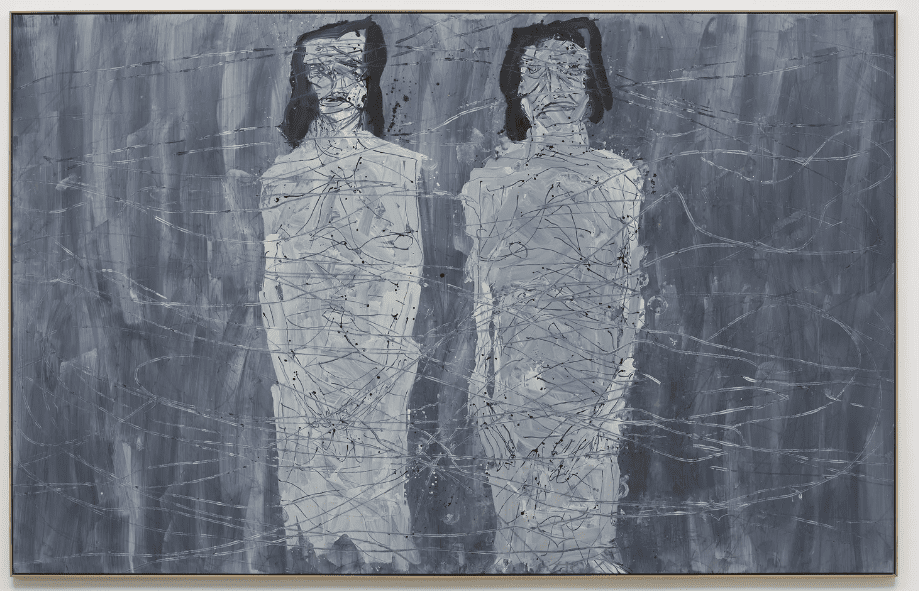Geezer Alert! This review contains nostalgic revisionism.
The under-thirties – oh ye of predictive texting and sleepful nights unbroken by groggy visits to the loo – will be baffled by the concept of a 'grower', perhaps assuming that it is an alternative phrase for 'viral' (itself an adjective that was once considered negative).
Before there were 90-second track previews on iTunes; before everything could be listened to on Grooveshark, LastFM, Spotify; before being able to swipe an entire provincial record shop's worth of catalogue in an afternoon's torrenting; before YouTube playlists, before all that was a time when….
Perhaps inspired by an awesome gig, maybe even on the basis of a single song heard on the radio, people in olden times would buy albums. Despite not knowing exactly what each song sounded like! Some even embraced the surprise – the idea that even if they didn't love every single track on the album, that there may have been some interest or value in exploring, aurally, the artistic vision of the musicians recording the songs.
swipe an entire provincial record shop's worth of catalogue in an afternoon's torrenting
Whacked-out though it may seem now, few of the album buyers even suspected what every torrent-jockey now knows as creed: that being FORCED to PAY for music that they had not even heard already was hegemonic econo-colonialism by the exploitative and evil corporate bean-counters of multinational musician-RAPIST quangos. Doh! Innocent times. People were weird then, they did other insane stuff too, back then. Teenagers would jet off to places like Thailand or Morocco without e-mail, gps apps or wi-fi! Others would fumble their way into entire sexual relationships without recourse to text messaging. People went out without first making sure they had a Bottle of Water!
exploitative and evil corporate bean-counters of multinational musician-RAPIST quangos
Since then, the internet has come along and made everyone happier. Obviously. The terrifying prospect of experiencing anything without Googling it beforehand is happily defunct. So how, then, can a 'grower' hope to thrive? Because, to interrupt the bile-flecked rantings of a tedious fogey and actually initiate the review section of this wall of text, Oliveray's Wonders is indeed a grower.

Oliveray are Peter Broderick and Nils Frahm. When Trebuchet asked Frahm about collaborating with other Erased Tapes artists last month, he was effusive about the experience: 'There is a warm vibe in this circle of musicians and we like to help each other out wherever we can….I couldn't be happier in this family.', but didn't actually mention the Oliveray project. Surprise. Another concept that the 24/7 surveillance culture of FaceBook and Foursquare makes seem quaint.
Frahm's use of the word 'family' seemed a touch twee in the interview, a little too 'thank you for the music, the songs we're singing' to be wholly comfortable. No-one expects a signed artist to bite the hand that feeds him – but to describe a record label as family stretched credibility somewhat. And so it would pass for a stock-response, until you listen to the off-record interaction between Frahm and Broderick in the interstices between tracks.
an intimacy to the recording that goes beyond gimickry
There is, as with Frahm's recent album Felt, an intimacy to the recording that goes beyond gimickry. We hear breaths being taken before the start; we hear the thud of fingers hitting piano keys, and piano keys hit for percussive purposes – not hard enough to actually sound a note but breathy, creaky and essential nonetheless. More than that, we hear interaction between Broderick and Frahm which is more than collaborative – it is familial.
Broderick's amused exasperation at what must be Frahm's pickiness at the end of 'Hiding Hydration' is familiar in the manner of siblings. 'Was that ok?', 'Yeah, that was a good one'. Broderick's reaction of mixed relief, amusement, irritation and satisfaction corroborates Frahm's claim that Erased Tapes is a family. Tough love.
But the album fails entirely on the first listen. The weight of expectation is too much. We know already that Broderick creates huge prarie-folk sonic panoramas. Musically he is the Anselm Adams of the pair. Frahm plays closer, more the internal mindscapes of a wholly European, metropolitan aesthetic. Together there would seem to be nothing between outright triumph or utter failure. Either more than the sum of its parts; or discordant cacophony.
Broderick's exceptional talent of making new compositions sound mythic
It's neither. Broderick's folksy violin opens the album, and between that and his vocals, seems on first listen to dominate the album. His vocal on the ancient-sounding 'The Book She Wrote and In The Time' brings the Irish traditional piece 'She Moved Through The Fair' to mind, and it is Broderick's exceptional talent of making new compositions sound mythic that catches the attention on first, and subsequent listens.
Hence the meandering digression into the term 'grower'. Because if this really were just an album of Peter Broderick songs with Nils Frahm on keys, that would be a dull case of missed opportunity. It's not though. Frahm captivated the music world on Felt with little more than a dampened piano. Here he does it again – playing space and silence with a deftness that is uncanny – tapping out harmonic depths and warped time signatures that take a couple of listens to even notice, but once noticed, are impossible to ignore.
Oliveray – Growing Waterwings by erasedtapes
Broderick sings on some songs, plays violin, constructs drones and presumably creates some of the electronic tracery that underlies 'Piano in the Pond'. On the track, Frahm plays a Fender Rhodes-type effect on his melodic line which lends a dirty grandeur to his jamming, accented by that disturbing screechy string malevolence Broderick has now perfected. It's eerie stuff.
There are lighter moments. 'Harmonics' is exactly that – the harmonics in question being between two vocal parts on what is otherwise a simple piano-guitar-voice song. Broderick's clean voice has little in the way of range, but in tone it belies his scant years with its authority 'The will fight/ But they'll ever win' he sings, and convinces.
'Hiding Hydration' verges too far into soundtrack territory. It is atmospheric and evocative, but lacks the narrative to go with the scenery it creates. If anything, it is too close to Mark Knopfler's soundtrack to Local Hero for comfort.
That track aside though, the pair achieve the effect of creating something which is at one new enough to demand repeat listening, but which is comfortingly familiar. Perhaps it is Broderick's vocal crescendo on 'You Don't Love' that evokes a Harvest-era Neil Young, or perhaps it is the timelessness of the folk melodies. Either way, in all the best ways, Wonders seems like a record you already had somewhere, lost, forgotten – but missed.
Oliveray – You Don't Love by erasedtapes

An observer first and foremost, Sean Keenan takes what he sees and forges words from the pictures. Media, critique, exuberant analysis and occasional remorse.















